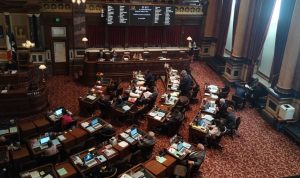Iowa Senate sends expanded Medicaid work requirements bill back to the House
May 14th, 2025 by Ric Hanson
(Iowa Capital Dispatch) – The Iowa Senate on Tuesday sent back to the House a bill to implement work requirements for the Medicaid program, although the Iowa Department of Health and Human Services has already requested a waiver from the federal government to implement similar requirements. There are some differences between Senate File 615 and the waiver request announced by Gov. Kim Reynolds in April. The legislative proposal would require people who receive health coverage through Iowa Health and Wellness Plan (IHAWP), the Medicaid coverage available for low-income, able-bodied adults from ages 19 to 64, to work at least 80 hours each month to stay in the program.
The HHS proposal sets a higher work requirement of 100 hours per month, and includes other means to retain IHAWP coverage, such as being enrolled in education or job skills programs, or earning the equivalent in wages to working 100 hours a month at $7.25 per hour. Both versions of the proposal contain exceptions for certain groups, including people with disabilities, individuals who are in a substance abuse treatment program for up to six months, and those with children under age 6.
While the legislative proposal has a lower monthly work requirement, it also contains a provision that would end the IHAWP program entirely if work requirements are ever approved by the federal government and later revoked. Iowa HHS would be directed to discontinue the expanded Medicaid program if federal law or regulations are changed to exclude work requirements in the future — contingent on the federal government having previously approved Iowa’s implementation of these restrictions.
Ending IHAWP would be subject to federal approval. If ending the program is not allowed, the state department would be directed to implement an alternative plan. Both the Senate and House have approved this measure, but the House had sent the legislation back to the Senate with an amendment clarifying the language calling for the discontinuation of IHAWP if the federal government revokes work requirement approval, in addition to adding a requirement for HHS to conduct and submit a report to lawmakers on the Medicaid for Employed People with Disabilities (MEPD) program by Dec. 15, 2025 — before the 2026 legislative session. The Senate amended the House’s change to remove the language calling for a MEPD report.

Sen. Mike Klimesh, R-Spillville, spoke May 13, 2025 on the legislation to implement work requirements for Iowa’s expanded Medicaid program. (Photo by Robin Opsahl/Iowa Capital Dispatch)
Sen. Mike Klimesh, R-Spillville, said the report was unnecessary as conversations on this topic will occur “on a voluntary basis” before the legislature reconvenes in 2026. Democrats criticized the measure, which they said will remove, due to reporting requirements, low-income people who are working and are in need of health coverage. Sen. Sarah Trone Garriott, D-West Des Moines, compared the feedback lawmakers received at the subcommittee meetings discussing IHAWP work requirements to the subcommittee held on the “Work Without Worry” legislation that proposed removing Medicaid income and asset limits for Iowans with disabilities.
While advocates and Iowans who attended at the “Work Without Worry” bill subcommittee praised the measure for allowing them to return to the workforce without risking the loss of health coverage, people at the subcommittee meeting for the bill setting Medicaid work requirements overwhelmingly spoke against the proposal. While supporters have said work requirements will help reduce the costs of Medicaid, Trone Garriott said other states that have implemented similar work requirements have not seen significant savings, and that these requirements will raise overall health care costs in the state because it will cause more people to be uninsured.
Senate Minority Leader Janice Weiner also said the legislature is moving forward with this measure “without having any firm idea what the fiscal impact will be.” The Legislative Services Agency fiscal notes on the bill stated the nonpartisan agency did not receive responses to multiple requests for information from HHS about the financial impact of implementing work requirements.
The bill was approved as amended in a 33-13 vote, and returns to the Iowa House.





